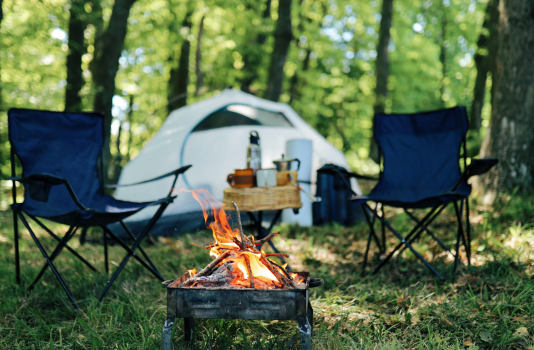Tips for Being a Mindful Hiker

Headed out on a camping trip?
Don’t forget these key tips to help you have an amazing time outdoors — while staying safe and minimizing your impact on the natural spaces we all love.
Evaluate the area before you set up camp
Check your surroundings and assess the surface where you plan to pitch your tent. Opt for durable surfaces whenever possible — like sand, gravel, rock, snow, or dry grass — which are better able to withstand repeated use and help minimize your impact.
Animal proof your food
You know who else might love that popular campsite you’re so fond of? Animals — especially bears, mice, and other critters that are aware that some tasty food is in the area. Prevent wildlife from stealing your food (and drawing near because of the smell of something tasty!) by packing your food with care in bear canisters or bear bags. Be sure to store food *at least* 100 feet away and downwind from your campsite for your safety.
Be respectful of your camp neighbors
In popular areas, give others a little space—think of it as a “camp buffer zone.” Pitch your tent away from trails and other campsites, keep voices and music low, and let everyone (including wildlife) enjoy the peace and quiet of the outdoors.
When nature calls…
No bathroom? That doesn’t *have* to be a problem, but it does require a little extra preparation. When nature calls, if you’re near a small body of water (lake, stream, etc.), be sure to do your business 200+ feet away from the water. For number 2 situations, pack a WAG bag, or other packable solution to capture human waste, and be sure to pack it out, too. Cat holes (at least 6″ deep!) are an option, but be sure to pack out your toilet paper!
Respect fire regulations
Before lighting a campfire, check current fire restrictions — many areas ban fires in dry seasons, even in designated fire rings. In some cases, propane fire pits are permitted, but always confirm ahead of time. When in doubt, skip the fire to be safe.
Consider the weather
No matter the forecast, come prepared for surprises. Avoid pitching your tent in valleys or low points where water collects if it rains. In canyon country, be especially cautious — flash floods can occur without warning. If your camping area allows for it, set up camp near natural barriers like boulders or shrubs to shield your site from wind.
Keep your furry camping companions contained
Even them most friendly and well-behaved dogs can scare wildlife, trample on sensitive plants, or disrupt neighboring campers. It’s always best to leash or tether your pet and, of course, always clean up after them!
